The DVS once again visits new viola frontiers! This time our intrepid reporter Karin Dolman is reporting from the very First Oskar Nedbal International Viola Competition in Prague (Oct 31st – Nov 3rd, 2019).
Well, it’s late Friday evening Nov 1st, I’ve spent all day listening to 41 candidates in the first round, with another 20+ to be heard tomorrow. I spent more than 12 hours in the recital hall today, for much of that time I was pretty much the only long-stay audience, except for the jury. I’ve been taking notes and making sketch drawings of all the candidates. I’m struggling to summarize my notes, but it’s an easy and fun start to assemble all the drawings into a composite picture:
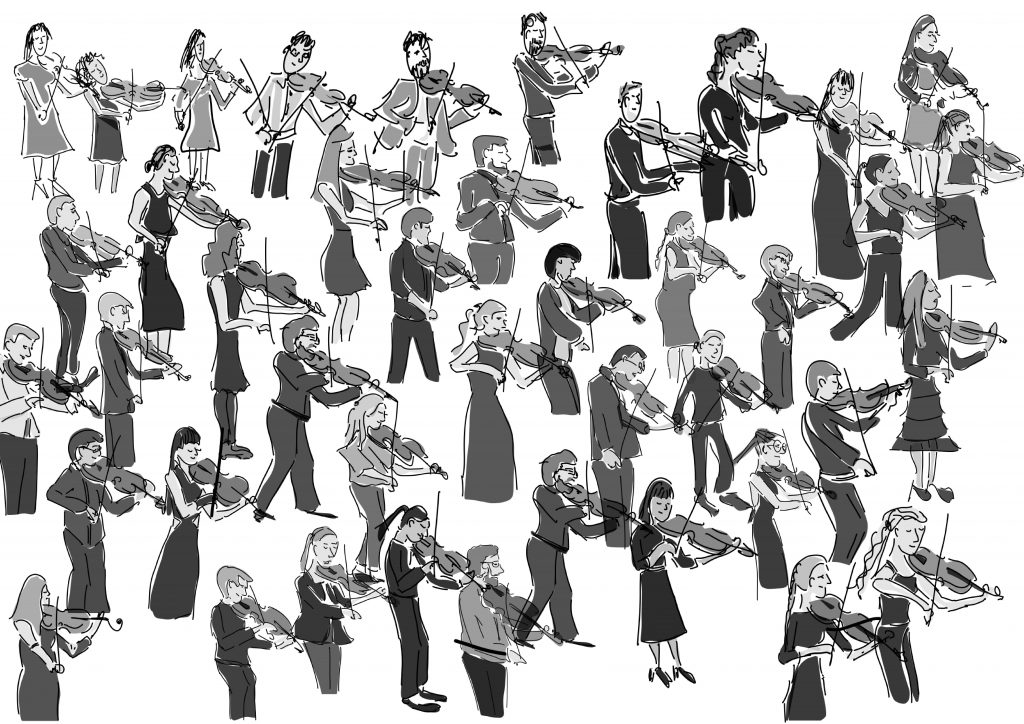 For the sake of avoiding reader overload, in the following I will discuss only the roughly top-third of the candidates that impressed me the most. But among the other (not-mentioned) candidates, it must be said that the large majority set down very praiseworthy performances. But just like the jury, I simply cannot pick them all. Again, these are purely my personal opinions, but I’m of course curious to know how they match up with the jury’s decisions for the 2nd round. Note: My listing is chronological by playing order, there is no internal “ranking” implied among those mentioned below.
For the sake of avoiding reader overload, in the following I will discuss only the roughly top-third of the candidates that impressed me the most. But among the other (not-mentioned) candidates, it must be said that the large majority set down very praiseworthy performances. But just like the jury, I simply cannot pick them all. Again, these are purely my personal opinions, but I’m of course curious to know how they match up with the jury’s decisions for the 2nd round. Note: My listing is chronological by playing order, there is no internal “ranking” implied among those mentioned below.
 The first candidate to make my list was Karolina Bednarz (Poland, age 22). A rise-and-shine entry at 09:15 in the morning, her programme included the Sarabande and Gigue from Bach’s 4th suite, and Piazzolla’s Etude no. 3, Tango., which she had transcribed herself for the viola (the original is for flute). Karolina starts with Bach. She has a good sound and plays very securely. The Sarabanda has a grave feel to it, the Gigue is played freely. She wisely takes extra time between Bach and Piazzolla to set a different stage and mood. Her persona seems to change with it. A real Piazzolla with a rhythmic beginning and a melodic middle segment. This transcription of hers is definitely worthwhile!
The first candidate to make my list was Karolina Bednarz (Poland, age 22). A rise-and-shine entry at 09:15 in the morning, her programme included the Sarabande and Gigue from Bach’s 4th suite, and Piazzolla’s Etude no. 3, Tango., which she had transcribed herself for the viola (the original is for flute). Karolina starts with Bach. She has a good sound and plays very securely. The Sarabanda has a grave feel to it, the Gigue is played freely. She wisely takes extra time between Bach and Piazzolla to set a different stage and mood. Her persona seems to change with it. A real Piazzolla with a rhythmic beginning and a melodic middle segment. This transcription of hers is definitely worthwhile!
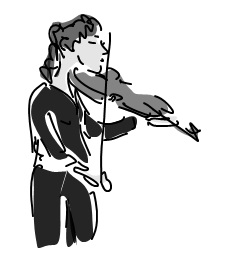 Melissa Dattas (France, age 22) knows how to make an entry! She chooses to stand in front of the stage, instead of climbing it (now that I mention it, some of the candidates before her stood way too far back on the stage!). And then she sets off with a fantastic C major Prelude from the 3rd Bach suite. This prelude and the ensuing Sarabande are meticulously played with interesting musical ideas! She follows with an equally impressive Capriccio by Vieuxtemps. I forget to take notes … I hope to see her again in the 2nd round (when she would play the Rebecca Clarke sonata).
Melissa Dattas (France, age 22) knows how to make an entry! She chooses to stand in front of the stage, instead of climbing it (now that I mention it, some of the candidates before her stood way too far back on the stage!). And then she sets off with a fantastic C major Prelude from the 3rd Bach suite. This prelude and the ensuing Sarabande are meticulously played with interesting musical ideas! She follows with an equally impressive Capriccio by Vieuxtemps. I forget to take notes … I hope to see her again in the 2nd round (when she would play the Rebecca Clarke sonata).
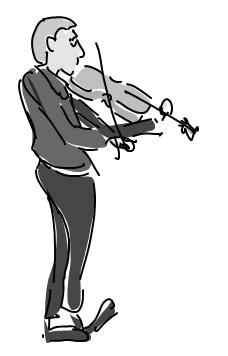 Jacob Dingstad (Norway, age 27) has long since graduated, and currently works as principal violist for the Finnish Radio Symphony Orchestra. His Prelude from 4th Bach suite (E flat) surprisingly starts out spiccato! It works quite well, giving a feeling of free flight, especially when the longer runs begin, later in the movement. Well done, and so free in his stage presence, it seems like he spontaneously creates it all in the moment. I feel like I ought to try playing more like that – very inspiring!
Jacob Dingstad (Norway, age 27) has long since graduated, and currently works as principal violist for the Finnish Radio Symphony Orchestra. His Prelude from 4th Bach suite (E flat) surprisingly starts out spiccato! It works quite well, giving a feeling of free flight, especially when the longer runs begin, later in the movement. Well done, and so free in his stage presence, it seems like he spontaneously creates it all in the moment. I feel like I ought to try playing more like that – very inspiring!
I sense some Norwegian Hardanger-fiddle music in the Sarabande. Perhaps he has some direct experience in this area? And then what a nice idea, transitioning directly from Bach’s final E-flat into the (C minor) Capriccio by Vieuxtemps! I would definitely like to see this Norwegian back in the next round.
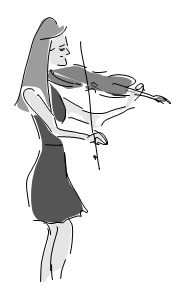 Martina Englmaierová (Czech Republic, age 24) starts with Prelude and Allemande from the 5th Bach suite, applying scordatura (the A-string tuned down to a G) to great effect in sound, and even giving a feel of naturally reinforced intonation. Martina has clearly studied the old performance practices, I really enjoy her playing.
Martina Englmaierová (Czech Republic, age 24) starts with Prelude and Allemande from the 5th Bach suite, applying scordatura (the A-string tuned down to a G) to great effect in sound, and even giving a feel of naturally reinforced intonation. Martina has clearly studied the old performance practices, I really enjoy her playing.
Her “solo piece of choice” is the 1st movement from Hindemith’s1937 sonata, one of my personal “bucket list” pieces. Very well played! I wouldn’t be surprised to see her in the next round. She’s really good, perhaps not at first sight the most impressive of today’s candidates, but her sound is so clean and pure, with very sparing use of vibrato (which also is a suitable choice for the Hindemith).
It’s time for lunch break, particularly appreciated by my “seat muscles”, the wooden chairs are not so merciful for long sits. We have heard 14 candidates (one-third of today’s programme).
 In the programme booklet, Yekun Fang (China, age 21) is depicted with his viola hovering in empty air between his hands (!) … he plays Sarabande and Gigue from the (violin) partita no.2. I’m very glad that he chose to play some repeats (in spite of the strict prohibition in the competition rules), in the Sarabande this is used to add beautiful ornamentations. And he plays the Gigue with amazing speed (so the repeat is hardly noticeable), with a super light bowing, without incurring “collateral damage” in the form of unwanted noises.
In the programme booklet, Yekun Fang (China, age 21) is depicted with his viola hovering in empty air between his hands (!) … he plays Sarabande and Gigue from the (violin) partita no.2. I’m very glad that he chose to play some repeats (in spite of the strict prohibition in the competition rules), in the Sarabande this is used to add beautiful ornamentations. And he plays the Gigue with amazing speed (so the repeat is hardly noticeable), with a super light bowing, without incurring “collateral damage” in the form of unwanted noises.
He continues with the Capriccio by Vieuxtemps, beautifully played, as if imagined there-and-then. His stage presence can bear some improvement though, propped into the rear corner of the stage, as if playing mostly for himself (and being incredibly good at it).
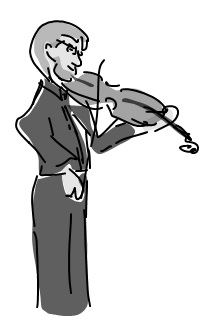 Then there’s Nicolas Garrigues (France, age 20), who plays the Molto sostenuto and Molto vivace from Reger’s 1st suite. Like his compatriot Mellissa Dattes, he chooses to stand in front of the stage, improving his contact with the audience, and also sounding better. With the exception of one small glitch in the fast movement, he plays a perfect Reger. His “choice” solo piece is Hindemith’s 25.1, 3rd and 4th movements. He creates great contrasts, he dares to play a real piano, in the slow 3rd movement. This beautiful recital hall allows it. His use of vibrato is carefully adapted to the local context. His rendition of the (in)famous “Tonschönheid ist Nebensache” is impeccable, going full throttle without sacrificing quality. From what I’ve heard so far, I can see this guy winning a prize. But you never know …
Then there’s Nicolas Garrigues (France, age 20), who plays the Molto sostenuto and Molto vivace from Reger’s 1st suite. Like his compatriot Mellissa Dattes, he chooses to stand in front of the stage, improving his contact with the audience, and also sounding better. With the exception of one small glitch in the fast movement, he plays a perfect Reger. His “choice” solo piece is Hindemith’s 25.1, 3rd and 4th movements. He creates great contrasts, he dares to play a real piano, in the slow 3rd movement. This beautiful recital hall allows it. His use of vibrato is carefully adapted to the local context. His rendition of the (in)famous “Tonschönheid ist Nebensache” is impeccable, going full throttle without sacrificing quality. From what I’ve heard so far, I can see this guy winning a prize. But you never know …
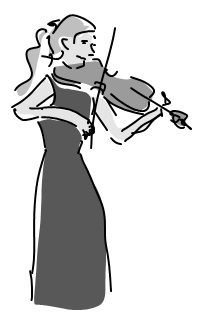 Next notable in my book is Clara Holdenried (Germany, age 24), playing the Prelude and Sarabande from Bach’s 4th suite, and the Vieuxtemps Capriccio. It’s a real pity that she loses her footing in the Prelude, because her playing is very beautiful and natural. For chamber music, you really want someone like Clara. I have the impression that she can produce any tone colour she wants. Her tone quality in Vieuxtemps is also very beautiful. She might try to generate more intimacy in her performance. I’m curious if she makes the 2nd round, I would certainly like to hear more of her.
Next notable in my book is Clara Holdenried (Germany, age 24), playing the Prelude and Sarabande from Bach’s 4th suite, and the Vieuxtemps Capriccio. It’s a real pity that she loses her footing in the Prelude, because her playing is very beautiful and natural. For chamber music, you really want someone like Clara. I have the impression that she can produce any tone colour she wants. Her tone quality in Vieuxtemps is also very beautiful. She might try to generate more intimacy in her performance. I’m curious if she makes the 2nd round, I would certainly like to hear more of her.
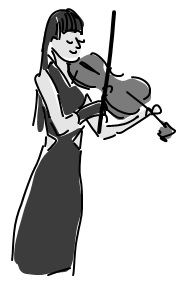 Alexandra Ivanova (Russia, age 25) launches a spectacular Hindemith 1937 sonata (1st mvt), with great ease of playing and lots of bravura. She has an impressive stage presence. She then re-tunes her viola for the 5th Bach suite (Prelude and both Gavottes), embarking on a very authentic and personal interpretation, with striking ornamentation. The fugue section – so good! She definitely must be a 2nd round choice. A small error towards the end of the movement, I don’t really mind, but it was unexpected. And then some technical issues in the Gavottes, that could hurt her chances.
Alexandra Ivanova (Russia, age 25) launches a spectacular Hindemith 1937 sonata (1st mvt), with great ease of playing and lots of bravura. She has an impressive stage presence. She then re-tunes her viola for the 5th Bach suite (Prelude and both Gavottes), embarking on a very authentic and personal interpretation, with striking ornamentation. The fugue section – so good! She definitely must be a 2nd round choice. A small error towards the end of the movement, I don’t really mind, but it was unexpected. And then some technical issues in the Gavottes, that could hurt her chances.
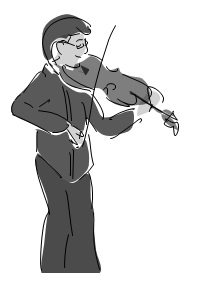 MinGwan Kim (South Korea, age 28) brings a violin-virtuosic programme. What more can one say when someone plays a perfect and musical Bach Chaconne? All the voices are perfectly audible.Followed by Ysaÿe’s breakneck Obsession (2nd sonata, 1st movement) with the Dies Irae theme. This is a serious prize candidate. To take those tenths, on such a big viola too. What a great violist!
MinGwan Kim (South Korea, age 28) brings a violin-virtuosic programme. What more can one say when someone plays a perfect and musical Bach Chaconne? All the voices are perfectly audible.Followed by Ysaÿe’s breakneck Obsession (2nd sonata, 1st movement) with the Dies Irae theme. This is a serious prize candidate. To take those tenths, on such a big viola too. What a great violist!
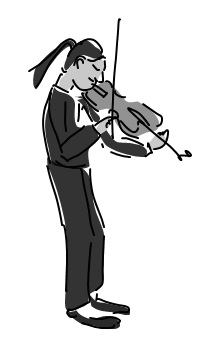 Yizilin Liang (China, age 19) plays from Bach’s 6th suite, as the only one so far employing a baroque bow for this purpose. In my ears she does not capitalize on this specialized hardware in the Prelude, but it works out very well in the Sarabande. The agility with string crossings is audibly and visibly improved, allowing to comfortably tackle challenges such as two chords in a single stroke.
Yizilin Liang (China, age 19) plays from Bach’s 6th suite, as the only one so far employing a baroque bow for this purpose. In my ears she does not capitalize on this specialized hardware in the Prelude, but it works out very well in the Sarabande. The agility with string crossings is audibly and visibly improved, allowing to comfortably tackle challenges such as two chords in a single stroke.
She then switches to Vieuxtemps’ Capriccio (with a modern bow), a very good rendition. This could stand a chance for 2nd round selection. And to think she’s only 19… !
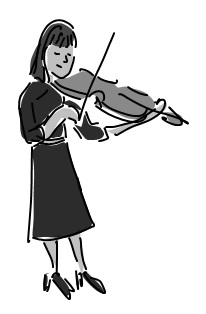 Entering the stage, Alyuan Liu (China, age 22) gives a very unassuming and even self-conscious impression. But once she starts playing – what a sound, and what a personality! A magnificient start, with the 6th Bach suite, Prelude and Allemande – you can hear a dialogue between different voices, different players.
Entering the stage, Alyuan Liu (China, age 22) gives a very unassuming and even self-conscious impression. But once she starts playing – what a sound, and what a personality! A magnificient start, with the 6th Bach suite, Prelude and Allemande – you can hear a dialogue between different voices, different players.
And then Hindemith, the first 2 movements of op.25.1 – also so good. And so musical! She is definitely a strong candidate for the 2nd round. But then – when the music dies away, Alyuan disappears from the stage without so much as a smile. I’m inclined to think that such behaviour should count, it may be peripheral, but it’s still a part of the whole performance.
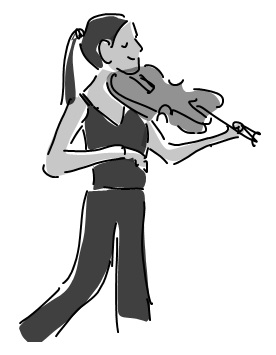 Hailing from Venezuela, Ruth Mogrovejo (age 25) starts off with a movement from Reger’s 3rd suite. Very well done. Good things are cooking in Venezuela, the cultural education results in many good young musicians. The “choice” piece is (once again) the Vieuxtemps Capriccio. I feel I’m getting a bit overexposed to this piece today, although that’s not Ruth’s fault (alone) of course..But her performance is certainly convincing, full of creative ideas. I wonder if the jury notices this too …
Hailing from Venezuela, Ruth Mogrovejo (age 25) starts off with a movement from Reger’s 3rd suite. Very well done. Good things are cooking in Venezuela, the cultural education results in many good young musicians. The “choice” piece is (once again) the Vieuxtemps Capriccio. I feel I’m getting a bit overexposed to this piece today, although that’s not Ruth’s fault (alone) of course..But her performance is certainly convincing, full of creative ideas. I wonder if the jury notices this too …
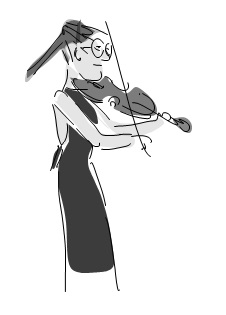 Julia Palecka (Poland, age 22) – at last, my prayers are heard: A free-choice piece NOT being Vieuxtemps or Hindemith! She brings the Fuga Libre by Garth Knox – such an amazing composer! Unfortunately the piece is longer than the maximum allowed 5 minutes, so although I could stay up all night listening to this, she is predictably interrupted by the jury before she can finish. She moves on to play the Prelude and Courante from the 5th Bach suite. I find Julia an intriguing young personality. Her Bach is very original. It is difficult to say whether such a strong character will make it to the next round, it depends on the taste of the jury. In my book, she’s in. I would love to hear what she would do with Schubert’s Arpeggione (her choice for round 2).
Julia Palecka (Poland, age 22) – at last, my prayers are heard: A free-choice piece NOT being Vieuxtemps or Hindemith! She brings the Fuga Libre by Garth Knox – such an amazing composer! Unfortunately the piece is longer than the maximum allowed 5 minutes, so although I could stay up all night listening to this, she is predictably interrupted by the jury before she can finish. She moves on to play the Prelude and Courante from the 5th Bach suite. I find Julia an intriguing young personality. Her Bach is very original. It is difficult to say whether such a strong character will make it to the next round, it depends on the taste of the jury. In my book, she’s in. I would love to hear what she would do with Schubert’s Arpeggione (her choice for round 2).
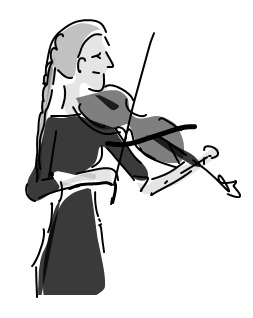 Then, last (for today) but not least, Connie Pharoah (Great Britain, age 20). She brings Bach’s 4th suite and the opening movements of Hindemith’s op.25 no.1. Her Bach is very good, even though it’s late evening by now. Like the French candidates, she positions herself in front of the stage. That sounds so much better!
Then, last (for today) but not least, Connie Pharoah (Great Britain, age 20). She brings Bach’s 4th suite and the opening movements of Hindemith’s op.25 no.1. Her Bach is very good, even though it’s late evening by now. Like the French candidates, she positions herself in front of the stage. That sounds so much better!
She follows through with a very convincing Hindemith. She definitely has good chances for the next round.
Well, tomorrow brings another 24 interesting candidates!
Karin
